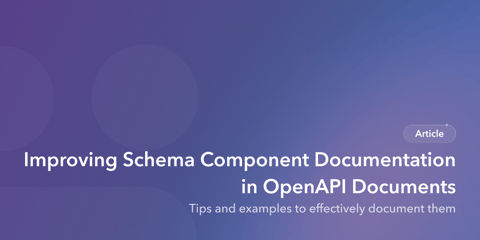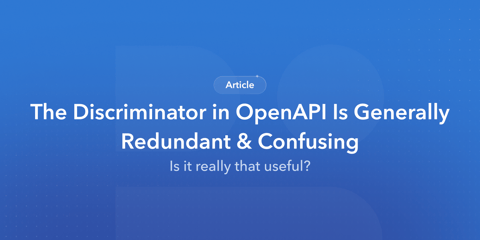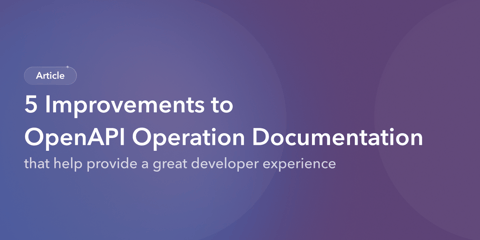Everyone working with OpenAPI (formerly Swagger) will have come across the PetStore at some point. It’s a sample OpenAPI description for an imaginary Pet Store with an API, but the OpenAPI is old, and the API it describes is pretty far from best practices. We thought it was time for a refresh, so we’re bringing you the Train Travel API, a new sample OpenAPI you can use for your tooling and testing.
Introducing the Train Travel API
The OpenAPI description document is on the train-travel-api GitHub repository, and comes in the form of a single openapi.yaml that you can use as a sample for any documentation, validation, mocking, or whatever tools that you maintain and want to show a working demo with something less contrived than a “Todo API” or the Pet Store.
It’s an open-source project licensed as Creative Commons Attribution-NonCommercial-ShareAlike 4.0 International.
Describes a Realistic API
This API builds off of various open data sources and public APIs that have all proven the concepts and patterns used in the design of this API.
The concept of Stations is based on Stations - A Database of European Train Stations, maintained by Trainline EU, and powered by OpenStreetMap, SNCF OpenData, Digitraffic.fi, OpenTransportData.swiss, admin.ch.
Station:
type: object
xml:
name: station
required:
- id
- name
- address
- country_code
properties:
id:
type: string
format: uuid
description: Unique identifier for the station
examples:
- efdbb9d1-02c2-4bc3-afb7-6788d8782b1e
- b2e783e1-c824-4d63-b37a-d8d698862f1d
name:
type: string
description: The name of the station
examples:
- Berlin Hauptbahnhof
- Paris Gare du Nord
address:
type: string
description: The address of the station
examples:
- Invalidenstraße 10557 Berlin, Germany
- 18 Rue de Dunkerque 75010 Paris, France
country_code:
type: string
description: The country code of the station
format: iso-country-code
examples:
- DE
- FR
timezone:
type: string
description: The timezone of the station in the IANA Time Zone Database format
examples:
- Europe/Berlin
- Europe/Paris
The concept of Trips and Bookings is based on the authors’ experiences trying to get around Europe, and wishing more booking apps had the ability to search for trains that would take a bicycle (and considering getting a dog to join him on those adventures). This domain knowledge is enough to get a handle on what an API should have for making trips and bookings easily, and feels somewhat more beneficial for the sample API than somebody guessing at what a pet shop might need.
Trip:
type: object
xml:
name: trip
properties:
id:
type: string
format: uuid
description: Unique identifier for the trip
examples:
- 4f4e4e1-c824-4d63-b37a-d8d698862f1d
origin:
type: string
description: The starting station of the trip
examples:
- Berlin Hauptbahnhof
- Paris Gare du Nord
destination:
type: string
description: The destination station of the trip
examples:
- Paris Gare du Nord
- Berlin Hauptbahnhof
departure_time:
type: string
format: date-time
description: The date and time when the trip departs
examples:
- '2024-02-01T10:00:00Z'
arrival_time:
type: string
format: date-time
description: The date and time when the trip arrives
examples:
- '2024-02-01T16:00:00Z'
operator:
type: string
description: The name of the operator of the trip
examples:
- Deutsche Bahn
- SNCF
price:
type: number
description: The cost of the trip
examples:
- 50
bicycles_allowed:
type: boolean
description: Indicates whether bicycles are allowed on the trip
dogs_allowed:
type: boolean
description: Indicates whether dogs are allowed on the trip
Booking:
type: object
xml:
name: booking
properties:
id:
type: string
format: uuid
description: Unique identifier for the booking
readOnly: true
examples:
- 3f3e3e1-c824-4d63-b37a-d8d698862f1d
trip_id:
type: string
format: uuid
description: Identifier of the booked trip
examples:
- 4f4e4e1-c824-4d63-b37a-d8d698862f1d
passenger_name:
type: string
description: Name of the passenger
examples:
- John Doe
has_bicycle:
type: boolean
description: Indicates whether the passenger has a bicycle.
has_dog:
type: boolean
description: Indicates whether the passenger has a dog.
Booking Payments are based pretty closely to the Stripe Payments API, and utilize the same polymorphic approach to accepting credit/debit cards, or bank account payments.
BookingPayment:
type: object
unevaluatedProperties: false
properties:
id:
description: Unique identifier for the payment. This will be a unique identifier for the payment, and is used to reference the payment in other objects.
type: string
format: uuid
readOnly: true
amount:
description: Amount intended to be collected by this payment. A positive decimal figure describing the amount to be collected.
type: number
exclusiveMinimum: 0
examples:
- 49.99
currency:
description: Three-letter [ISO currency code](<https://www.iso.org/iso-4217-currency-codes.html>), in lowercase.
type: string
enum:
- bam
- bgn
- chf
- eur
- gbp
- nok
- sek
- try
source:
description: The payment source to take the payment from. This can be a card or a bank account. Some of these properties will be hidden on read to protect PII leaking.
anyOf:
- title: Card
description: A card (debit or credit) to take payment from.
properties:
object:
const: card
type: string
name:
type: string
description: Cardholder's full name as it appears on the card.
number:
type: string
description: The card number, as a string without any separators. On read all but the last four digits will be masked for security.
cvc:
type: integer
description: Card security code, 3 or 4 digits usually found on the back of the card.
minLength: 3
maxLength: 4
writeOnly: true
exp_month:
type: integer
format: int64
description: Two-digit number representing the card's expiration month.
examples:
- 12
exp_year:
type: integer
format: int64
description: Four-digit number representing the card's expiration year.
examples:
- 2025
address_line1:
type: string
writeOnly: true
address_line2:
type: string
writeOnly: true
address_city:
type: string
address_country:
type: string
address_post_code:
type: string
required:
- name
- number
- cvc
- exp_month
- exp_year
- address_country
- title: Bank Account
description: A bank account to take payment from. Must be able to make payments in the currency specified in the payment.
type: object
properties:
object:
const: bank_account
type: string
name:
type: string
number:
type: string
description: The account number for the bank account, in string form. Must be a current account.
sort_code:
type: string
description: The sort code for the bank account, in string form. Must be a six-digit number.
account_type:
enum:
- individual
- company
type: string
description: The type of entity that holds the account. This can be either `individual` or `company`.
bank_name:
type: string
description: The name of the bank associated with the routing number.
examples:
- Starling Bank
country:
type: string
description: Two-letter country code (ISO 3166-1 alpha-2).
required:
- name
- number
- account_type
- bank_name
- country
status:
description: The status of the payment, one of `pending`, `succeeded`, or `failed`.
type: string
enum:
- pending
- succeeded
- failed
readOnly: true
This is just the schema components, and already you can see there is a lot there to learn from. Let’s look at a few bits.
The anyOf in source allows for documentation tools to show the different branches of valid JSON, and the title inside gives them a nice-looking name.
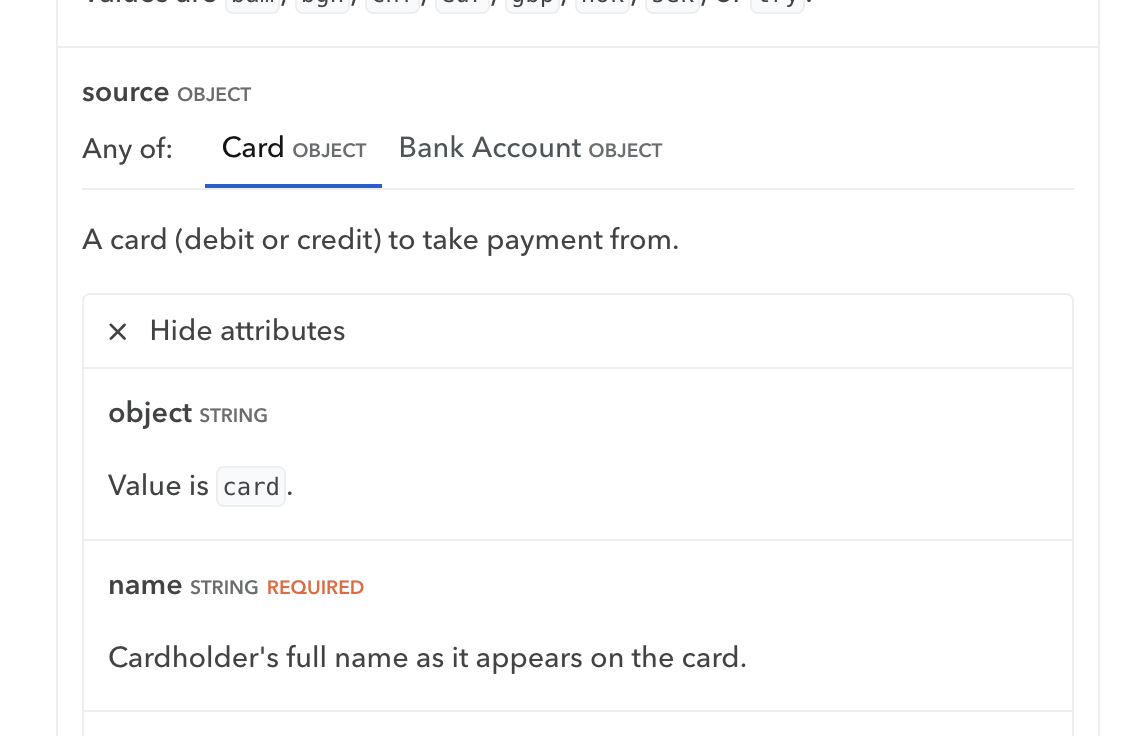
The use of readOnly/writeOnly lets you use the same schema for requests and responses, with most modern tooling knowing to strip the readOnly from request bodies and writeOnly from response bodies.
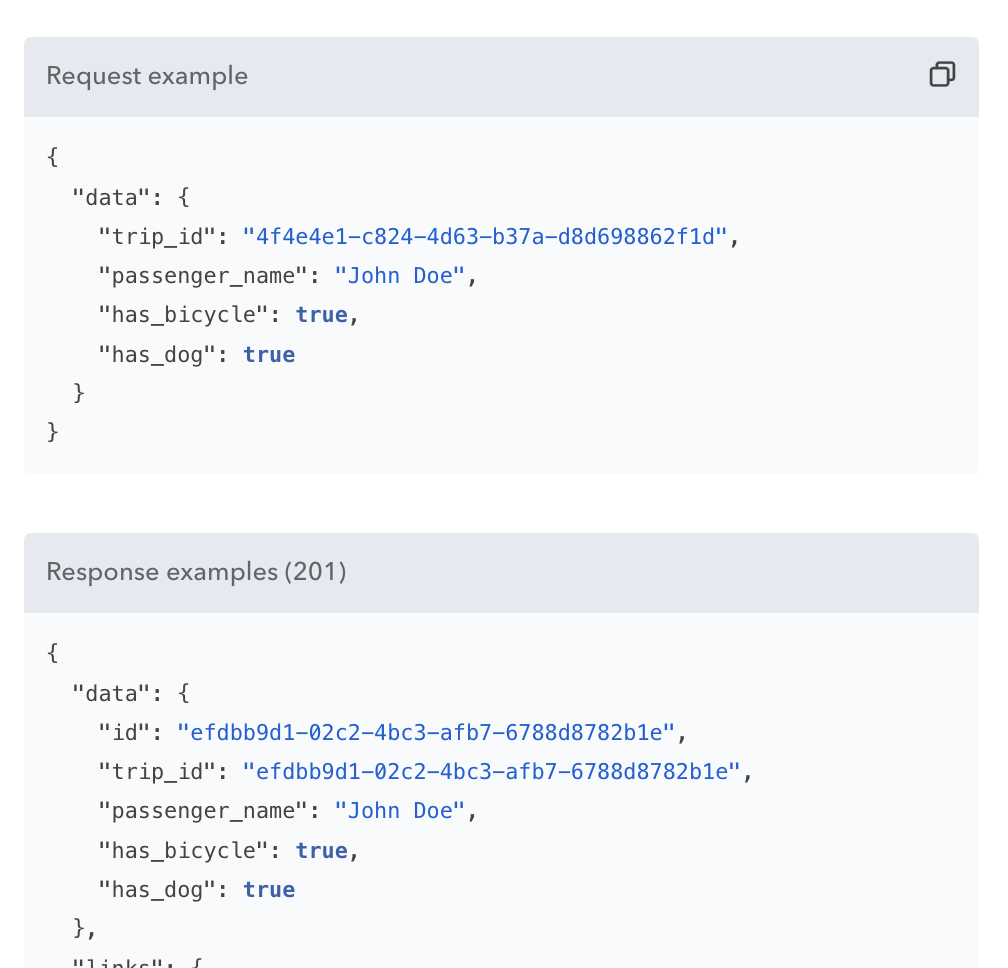
Standards & Conventions
The Train Trip API uses appropriate web standards whenever they exist and draft standards when they’re still in progress.
The API error responses conform to Problems Details (RFC 9457) instead of making up custom formats, and the rate-limiting follows the latest RateLimit Header fields IETF draft instead of the more common X-Rate-Limit convention.
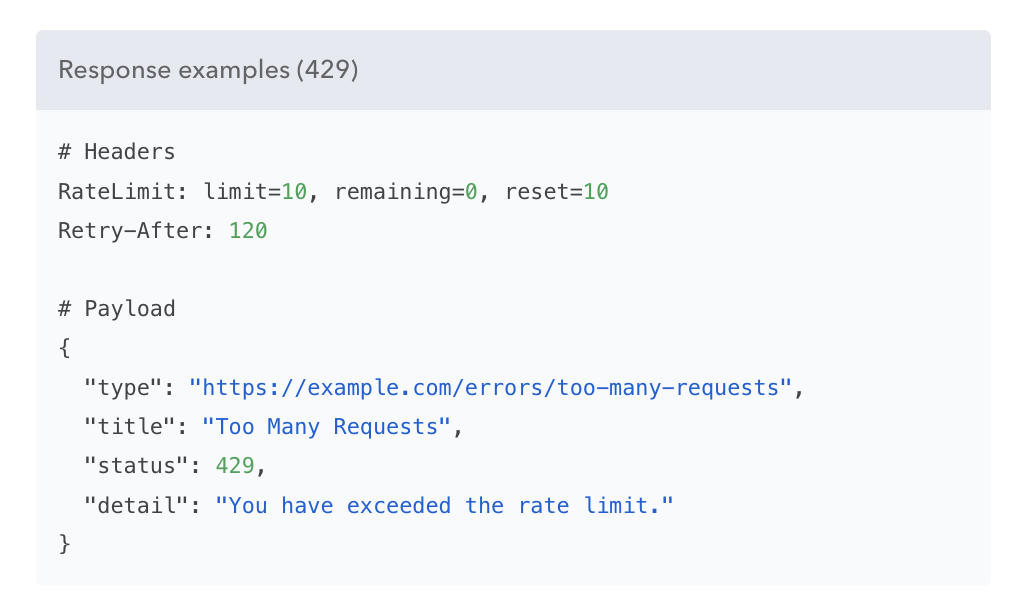
Country codes are ISO 3166, Currency codes are ISO 4217, dates and times are ISO 8601 as per RFC 3339, and the timezones are using IANA Time Zone Database format.
For the data format, using a standard like JSON:API or Hydra might have been a bit too confusing, but we wanted to do something more conventional than firing around raw JSON arrays for collections because that gets confusing for things like pagination. Seeing as most APIs use some sort of wrapper for collections to avoid using bare JSON arrays, the API uses a Wrapper-Collection. This leaves space for any simple HATEOAS controls for other resources or actions like self, and pagination controls for next and previous in the body.
Wrapper-Collection:
description: This is a generic request/response wrapper which contains both data and links which serve as hypermedia controls (HATEOAS).
type: object
properties:
data:
description: The wrapper for a collection is an array of objects.
type: array
items:
type: object
links:
description: A set of hypermedia links which serve as controls for the client.
type: object
readOnly: true
xml:
name: data
These are then extended with allOf in responses to avoid needing to define that format over and over again whilst still keeping the path item definitions simple.
/stations:
get:
summary: Get a list of train stations
description: Returns a list of all train stations in the system.
operationId: get-stations
tags:
- Stations
responses:
'200':
description: A list of train stations
content:
application/json:
schema:
allOf:
- $ref: '#/components/schemas/Wrapper-Collection'
- properties:
data:
type: array
items:
$ref: '#/components/schemas/Station'
- properties:
links:
allOf:
- $ref: '#/components/schemas/Links-Self'
- $ref: '#/components/schemas/Links-Pagination'
This is all merged down and flattened into a structure like this:

These examples were all then run through Spectral to make sure they were valid against their schema.
Built for OpenAPI v3.1 and modern JSON Schema
Unlike the Pet Store which was written in OpenAPI v2.0 then shoved through a v2.0 to v3.0 converter, the Train Travel API was designed from the start for OpenAPI v3.1.
This means it’s got useful demonstrations of newer functionality for Webhooks, reusing the same schema to show how you can avoid repeating schemas (once again benefitting from readOnly/writeOnly).
webhooks:
newBooking:
post:
operationId: new-booking
summary: New Booking
description: |
Subscribe to new bookings being created, to update integrations for your users. Related data is available via the links provided in the request.
tags:
- Bookings
requestBody:
content:
application/json:
schema:
allOf:
- $ref: '#/components/schemas/Booking'
- properties:
links:
allOf:
- $ref: '#/components/schemas/Links-Self'
- $ref: '#/components/schemas/Links-Pagination'
example:
id: efdbb9d1-02c2-4bc3-afb7-6788d8782b1e
trip_id: efdbb9d1-02c2-4bc3-afb7-6788d8782b1e
passenger_name: John Doe
has_bicycle: true
has_dog: true
links:
self: https://api.example.com/bookings/1725ff48-ab45-4bb5-9d02-88745177dedb
responses:
'200':
description: Return a 200 status to indicate that the data was received successfully.
headers:
RateLimit:
$ref: '#/components/headers/RateLimit'
It’s also using unevaluatedProperties, the modern replacement for additionalProperties which understands allOf in subschemas, helping make sure clients do not fire over properties thinking they are being saved whilst silently being ignored.
BookingPayment:
type: object
unevaluatedProperties: false
properties:
...
Learn more about unevaluatedProperties on the JSON Schema documentation.
Finally, we are utilizing every type of example that OpenAPI knows how to support.
One sort of example is “Property Examples” which go on individual properties. Each property having their own example means lists of properties will individually make sense in many documentation tools, regardless of which example is picked to go in the request/response examples.
source:
anyOf:
- title: Card
description: A card (debit or credit) to take payment from.
properties:
object:
const: card
type: string
name:
type: string
description: Cardholder's full name as it appears on the card.
examples:
- Francis Bourgeois
number:
type: string
description: The card number, as a string without any separators. On read all but the last four digits will be masked for security.
examples:
- '4242424242424242'
cvc:
type: integer
description: Card security code, 3 or 4 digits usually found on the back of the card.
minLength: 3
maxLength: 4
writeOnly: true
examples:
- 123
Then, each request/response has at least one example of the whole response.
responses:
'200':
description: Payment successful
headers:
RateLimit:
$ref: '#/components/headers/RateLimit'
content:
application/json:
schema:
allOf:
- $ref: '#/components/schemas/BookingPayment'
- properties:
links:
$ref: '#/components/schemas/Links-Booking'
examples:
Card:
summary: Card Payment
value:
id: 2e3b4f5a-6b7c-8d9e-0f1a-2b3c4d5e6f7a
amount: 49.99
currency: gbp
source:
object: card
name: J. Doe
number: '************4242'
cvc: 123
exp_month: 12
exp_year: 2025
address_country: gb
address_post_code: N12 9XX
status: succeeded
links:
booking: https://api.example.com/bookings/1725ff48-ab45-4bb5-9d02-88745177dedb/payment
Bank:
summary: Bank Account Payment
value:
id: 2e3b4f5a-6b7c-8d9e-0f1a-2b3c4d5e6f7a
amount: 100.5
currency: gbp
source:
object: bank_account
name: J. Doe
account_type: individual
number: '*********2345'
sort_code: '000123'
bank_name: Starling Bank
country: gb
status: succeeded
links:
booking: https://api.example.com/bookings/1725ff48-ab45-4bb5-9d02-88745177dedb
This is not always necessary, but is exceptionally helpful when there is polymorphism, or other variable payloads, because you can name the examples, and good documentation tools will let viewers pick between them.
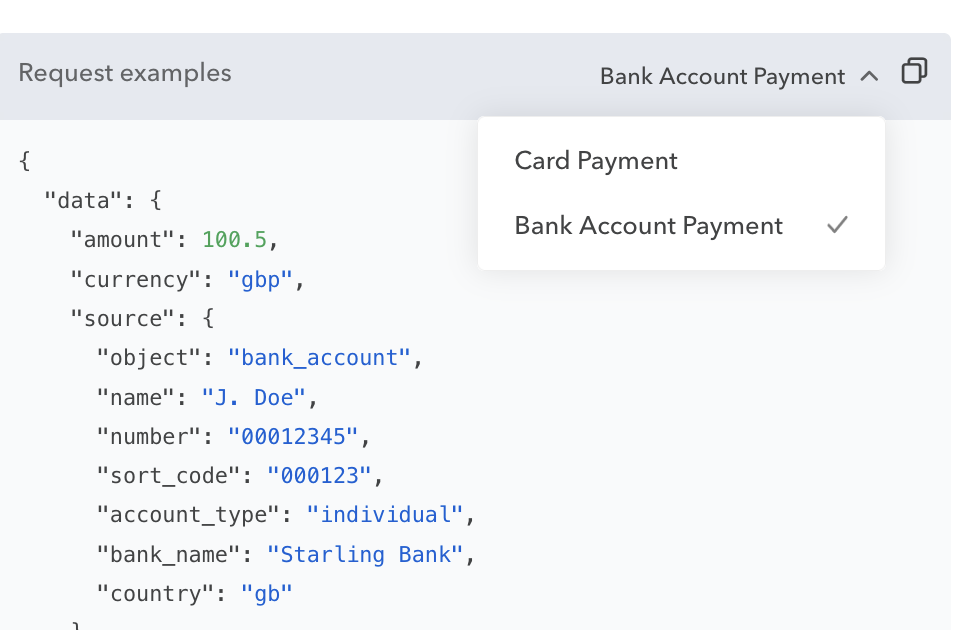
API Design First
We’ve built the OpenAPI, but currently, there is no API implementation. Should we build a real, working API to go with this sample?
If we’re going to do that, we should follow the API Design First principles and make sure the API Design is as good as possible first. Seeing as this is an open-source project, perhaps you could swing by with your feedback.
I was wondering about renaming Trips to Services, or perhaps there is a better word?
Perhaps Bookings should become Reservations, because is it a booking if you have not paid? Then, we could rename BookingPayment to Payment, as you need to pay for a reservation before it expires.
I also wondered about listing multiple prices for different classes and services; we could even add support for passes.
If you’d like to get involved with evolving and improving the OpenAPI please swing by the issue tracker and help out.
If you maintain OpenAPI tooling and still have the Pet Store in there, please consider removing it or keeping it around as an option but using this one by default. We need to be building our tools to support the very best OpenAPI has to offer, and using samples stuck so far in the past is doing a disservice to your tools and your potential users.
